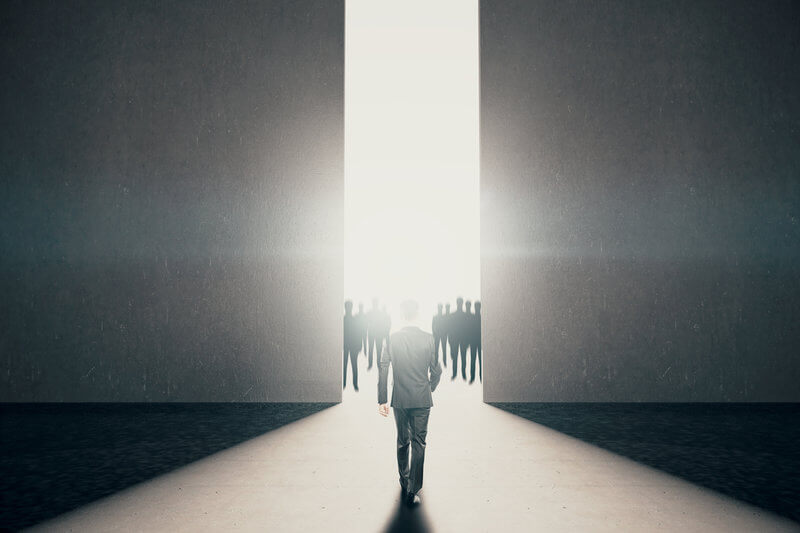American psychologist Barry Schwartz’s counterintuitive study argues uncomfortably similarly to communist philosophy, while offering a stunning argument for Christianity, the enemy of communism.
One day, early in the morning, an old man who lived on the shore of a lake saw a young man fishing on the other shore. He followed him all day and saw that every time the young man caught a big fish, he threw it back into the water. But every time he caught a smaller fish, he kept it. Towards the end of the day, the old man worked up the courage to cross to the other side of the lake and ask the young man about this strange ritual. Amused, the young man told him that he only had a small frying pan, so he didn’t need the big fish. The famous trainer John Maxwell used to tell this story along with the advice that we should all get bigger frying pans. Because when opportunity knocks, it’s a shame to miss it because you don’t have a big enough frying pan…
American psychologist Barry Schwartz would have disagreed with Maxwell and congratulated the young man. As the author of the “paradox of choice“, Schwartz would probably have said that the young man had acted like someone who knew his capabilities, was satisfied with them and had set his standards accordingly. Now, the fact that any ordinary cook would have cut up the big fish just enough to fit into the small pan and made a soup with the rest of the fish is another story—one that we will leave aside because it would prevent us from discovering the counterintuitive and very useful observations that Schwartz makes about society.
The cult of freedom
“In the United States,” Schwartz writes (but he might as well have written “in Europe”), “we live in a time and a place in which freedom and autonomy are valued above all else and in which expanded opportunities for self-determination are regarded as a sign of the psychological well-being of individuals and the moral well-being of the culture.” So far so good, right? What would a society look like in which freedom and autonomy were not valued? Just think of a Nazi concentration camp. And on this occasion we cannot help but recall the words of one of the most famous survivors of Auschwitz, Viktor Frankl, who said that “everything can be taken from a man but one thing: the last of the human freedoms—to choose one’s attitude in any given set of circumstances, to choose one’s own way.”[1]

Freedom is vital not only for individuals but also for societies. Without the deification of autonomy, our society would be unrecognisable. But while “it is axiomatic that it is good to have choices, it is not necessarily better to have many choices.” This is the famous paradox of choice proposed by Schwartz: choice is good, but more choice creates unhappiness. The psychologist tested his theory in several studies on American subjects and found that as the number of choices we have to make increases, the negative aspects of having more choices become more apparent. Moreover, when the choices we have in life become excessive, freedom can become nothing less than self-imposed tyranny.
Who would ever want to eat soy salami again?
Every day we make hundreds, perhaps thousands, of decisions. Some are big: which phone subscription to take, which pension plan to choose; others are so small we don’t even think about them, like what to have for lunch today. Stores are by far the realm of the most varied and advantageous choices. One shop we visited sells no less than 113 varieties of breakfast cereals, 277 varieties of sweet biscuits, 288 varieties of juices and 409 varieties of shampoo. According to Ioana Dumitru, the store’s communications manager, a weekly visit to the store gives you the chance to choose from no more and no less than 96,662 products.
I’m not saying it was better under communism, when we had a “choice” of one type of salami, the soy one, which was only available in the supermarket on certain days of the week and only to those who could endure the queues that started at four in the morning. But if we’re honest with ourselves, we realise that it’s not need that determines what we buy. Most of the time, we don’t buy something to satisfy a need, but more something that also helps us express ourselves. For example, I need a bottle of still water to make lemonade. But I’m not going to buy the cheap one, which is still water with decent properties and a price that is affordable to everyone; I’m going to buy the expensive one, because I feel it represents me with its elegant packaging and its reputation for being the choice of celebrities. Our choices tell the world something about us. They convey our identity to others. And so the days of inherited identity are gone, and we hardly realise it.
Choices consume our psychological resources; they make us tired. And the more choices there are, the more tired we are. Some people seem to have a natural tendency to tire themselves mentally by making more or less useful choices. They are the ones who want to get the most out of every situation.
The contemporary philosopher Alain de Botton makes the same point when referring to one of the most obvious sociological changes in the Western world: the attitude towards marriage. In a speech on the cultural impact of the Romantic movement, Botton pointed out that most people today no longer marry for pragmatic reasons (sharing the financial burden of living with someone, ensuring support in work and old age through children), nor do they marry who their parents want them to marry, but they choose their own partner according to their own values and ideals. Or they choose not to marry at all.
“If we’re rational, they tell us, added options can only make us better off as a society,” Barry Schwartz summarises. But intergenerational comparisons contradict this cultural consensus. People today consider themselves luckier and happier than previous generations, yet the incidence of clinical depression and suicide attempts has risen dramatically over this period.[2] In other words, although we have access to comforts and technology that even royalty did not have a century ago,[3] we are objectively unhappier. Some might say that depression is only now being accepted as an illness, which explains its supposedly higher incidence, but suicide has always been considered suicide and still carries the same negative stigma today as it did in the past. But what if a partial explanation is that we have burdened our own lives with choices?
Superlative seekers
The American psychologist Roy Baumeister believed that the human psyche treats willpower as a resource—a limited or expendable one, like attention,[4] so we should choose wisely where to invest our willpower and where not to. Extrapolating, Schwartz’s study seems to suggest something similar: choices consume our mental resources, they make us tired. And the more choices we make, the more tired we become. But Schwartz also makes another interesting observation. Some people seem to have a natural tendency to tire themselves out by making more or less useful choices. He calls them maximisers—people who want to get the most out of any situation. When faced with a problem, they want the best solution. When faced with a choice, they want the option that is most advantageous to them in the most ways. They are superlative seekers.
We might say that the maximiser is a perfectionist, an individual so passionate about excellence that he can only pursue it with blind fidelity. But we would be wrong. The maximiser seeks the superlative not for the sake of perfection, but for fear of regret that he has settled for too little when he could have done better, or that others like him have achieved more, or that he was not capable enough to choose better, and so on. The maximiser is a slave to regret, and measurements by Schwartz’s team using standardised psychological scales have shown that maximisers are more depressed than satisficers (people who stop looking for a solution once they have found one that meets a certain criterion of their own; those who look not for the optimal solution but for the satisfactory one), have lower self-esteem and higher levels of neuroticism. But before we feel sorry for maximisers and categorise them as “contemporary freaks” we should realise that many of us are maximisers in at least some areas of our lives, and in doing so we are reducing our own chances of happiness.
The wheel of misfortune
Maximising as a lifestyle leads to personal bankruptcy. The explanation for this “law” can be found in the work of another renowned American psychologist, Daniel Kahneman, who has drawn attention to a mechanism that massively influences our happiness: the ability to adapt to circumstances. This ability is a double-edged sword because, according to Kahneman, people can adapt not only to negative but also to positive circumstances.[5] The experiment used to illustrate this ability was interesting. Specifically, Kahneman compared the attitudes of some lottery winners with those of people who had been paralysed in car accidents, both within the previous year. Predictably, the former were happier than the latter. But surprisingly, the lottery winners were not much happier than the general population, while the paraplegics, although slightly unhappier than the general population, still considered themselves happy. Both the newly rich and the poor injured had adapted to their new circumstances.

Hedonic adaptation is a useful and widespread mechanism, but its downside is that, if not recognised, it can ultimately lead to disappointment. How does this happen? To take the previous example, I would expect my life to change for the better after winning the lottery, but as I get used to the benefits of financial comfort, it becomes my new ground zero and I start to have different expectations. When I reach those, I’ll adjust again, and I’ll still be unhappy and looking for new goals. That’s what Kahneman calls the satisfaction treadmill, a concept that deserves a metaphorical translation: we chase happiness like hamsters on a cage wheel. We move, we get tired, we reach another step on the wheel, but in reality we have not arrived anywhere. Although we are physically on a different level, in our mind/heart we are left with the same search for more.
When our achievements keep up with expectations, we live better, but we don’t feel more satisfied with our lives. Isn’t that strange?
Infinite but limited choices
Fortunately, there are solutions to this marathon of happiness in which we’ve found ourselves, and some of them were on the horizon even before Schwartz put his contemporary finger in the wound.[6]
First, if unbridled freedom makes us unhappy, we might infer that less freedom will contribute to our happiness. This is a paradox, but we apply it without blinking an eye in many areas. For example, the psychological consensus is that close relationships fulfil us, make us happy. But close relationships come with rules—marriage requires exclusivity, friendship by definition requires fidelity. Being free to make a friend sometimes means sacrificing other freedoms for the sake of friendship.
The conclusion is surprising to the dogmatic individualism of today’s culture, but it seems to suggest that the freedom that makes us happy is the freedom that manifests itself within a framework of choices that have limitations—or, more poetically, our choices make us happy when they are infinite within a limited framework.
From a Christian perspective, it is easy to see the logic of this. In Eden, the first couple could eat any fruit of the earth except the forbidden fruit. And the breaking of this law caused the catastrophe known as “original sin.” Beyond this symbolic interpretation, today we have the Ten Commandments. This set of laws says that we can only be happy if we follow certain rules. (And look at the disasters that happen when we break them!)
The narrowing of perspective that Christ recommends is liberating and meaningful. Christianity teaches that human nature forces us to be limited beings for the time being. And it is plausible to believe that our limitations also require/impose certain external limitations.
Interestingly, in his—obviously secular—study, Schwartz seems to argue for solutions that Christians have known, or should have known, for thousands of years. He suggests, for example, that we should manage our regrets so that they don’t poison every decision we make or cause us to avoid making any decision at all. Christianity teaches that God accepts people’s regrets as an offering; that is, people’s repentance is like a sacrifice that God expects from them, but once expressed, regret no longer enslaves the believers, just as the sacrifice, once offered, is burned. Regret has a function, but it does not work if it is made permanent.
Remorse sensitises a person and makes them respect the “divine rule” in which they can be happy.
The psychologist goes on to recommend the practice of gratitude, noting that although it doesn’t come naturally to us, being thankful for what we already have can save us from the trap of becoming obsessed with comparing what could have been better. “The Beatitudes” (Matthew 5) are, in Christianity, the culmination of the verbal preaching of Jesus Christ. But their content is shocking because they assume that people can be happy in circumstances where only unhappiness would be expected (hardship, weeping, persecution).
Moreover, perhaps the most widespread solution is one that can appeal even to a maximiser: “Learn to love limitations.” But how can you expect that to work, when it’s like telling a maximiser to get off the hamster wheel and stop obsessively seeking “the greater good”? Well, the argument is compelling because, as Schwartz says, “by deciding to follow a rule (for example, always wear a seat belt; never drink more than two glasses of wine in one evening), we avoid having to make a deliberate decision again and again. This kind of rule-following frees up time and attention that can be devoted to thinking about choices and decisions to which rules don’t apply.”
Similarly, Christianity urges humans to allow God to engrave the law of goodness and faithfulness on their hearts, and not to lose their souls in vengeance and lawlessness (Proverbs 3:3).
Not coincidentally, the Bible verse that contains this admonition is attributed to King Solomon, a maximiser who confessed that he had lived every experience available to a mortal of his time and concluded that it was all “a chasing after the wind” (Ecclesiastes 1:17). Solomon, before Kahneman, discovered the satisfaction of the treadmill and wrote so that others would not do what he did. Centuries later, Christ Himself ended Solomon’s quest and initiated it for those who were to call themselves Christians when He exhorted them to “seek first His kingdom and His righteousness,” promising that “all these things will be given to you as well” (Matthew 6:33).
In this way, Christ redefined what it means to “think freely.” The narrowing of perspective that Christ recommends is liberating and meaningful. Christianity teaches that human nature compels us to be limited beings for the time being. And it is plausible to think that our limitations also require/impose certain external limitations. But limiting ourselves to seeking the kingdom actually opens the mind to the infinity of eternity, towards a reality where limited beings will no longer have limits. And who knows what our freedom will be like when, as the Bible says, “we shall be like Him” (1 John 3:2)….



















